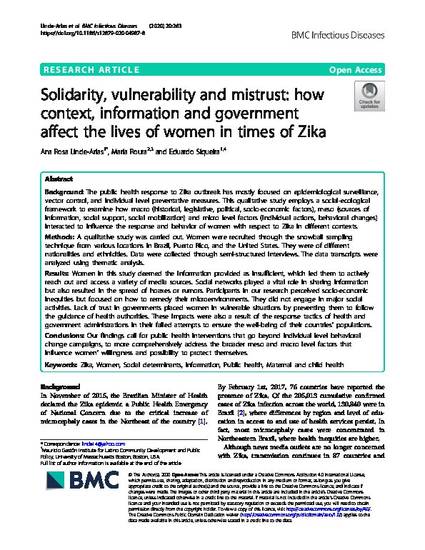
Article
Solidarity Vulnerability and Mistrust.pdf
BMC Infectious Diseases
(2020)
Abstract
Background: The public health response to Zika outbreak has mostly focused on epidemiological surveillance, vector control, and individual level preventative measures. This qualitative study employs a social-ecological framework to examine how macro (historical, legislative, political, socio-economic factors), meso (sources of information, social support, social mobilization) and micro level factors (individual actions, behavioral changes) interacted to influence the response and behavior of women
with respect to Zika in different contexts.
Methods: A qualitative study was carried out. Women were recruited through the snowball sampling technique from various locations in Brazil, Puerto Rico, and the United States. They were of different nationalities and ethnicities. Data were collected through semi-structured interviews. The data transcripts were analyzed using thematic analysis.
Results: Women in this study deemed the information provided as insufficient, which led them to actively reach out and access a variety of media sources. Social networks played a vital role in sharing information but also resulted in the spread of hoaxes
or rumors. Participants in our research perceived socio-economic inequities but focused on how to remedy their micro environments. They did not engage in major social activities. Lack of trust in governments placed women in vulnerable situations by preventing them to follow the guidance of health authorities. These impacts were also a result of the response tactics of health and government administrations in their failed attempts to ensure the well-being of their countries’ populations.
Conclusions: Our findings call for public health interventions that go beyond individual level behavioral change campaigns, to more comprehensively address the broader meso and macro level factors that influence women’ willingness and possibility to protect themselves.
Keywords
- Zika,
- Women,
- social determinants of health
Disciplines
Publication Date
April 3, 2020
DOI
10.1186/s12879-020-04987-8
Publisher Statement
This article is licensed under a Creative Commons Attribution 4.0 International License, which permits use, sharing, adaptation, distribution and reproduction in any medium or format, as
long as you give appropriate credit to the original author(s) and the source, provide a link to the Creative Commons licence, and indicate if changes were made. The images or other third party material in this article are included in the article's Creative Commons licence, unless indicated otherwise in a credit line to the material. If material is not included in the article's Creative Commons licence and your intended use is not permitted by statutory regulation or exceeds the
permitted use, you will need to obtain permission directly from the copyright holder. To view a copy of this licence, visit http://creativecommons.org/licenses/by/4.0/. The Creative Commons
Public Domain Dedication waiver (http://creativecommons.org/publicdomain/zero/1.0/) applies to the
data made available in this article, unless otherwise stated in a credit line to the data.
Citation Information
Ana Rosa Linde Arias, Maria Roura and Carlos Eduardo Siqueira. "Solidarity Vulnerability and Mistrust.pdf" BMC Infectious Diseases Vol. 20 (2020) p. 263 - 275 ISSN: 1471-2334 Available at: http://works.bepress.com/carlos_siqueira/54/
